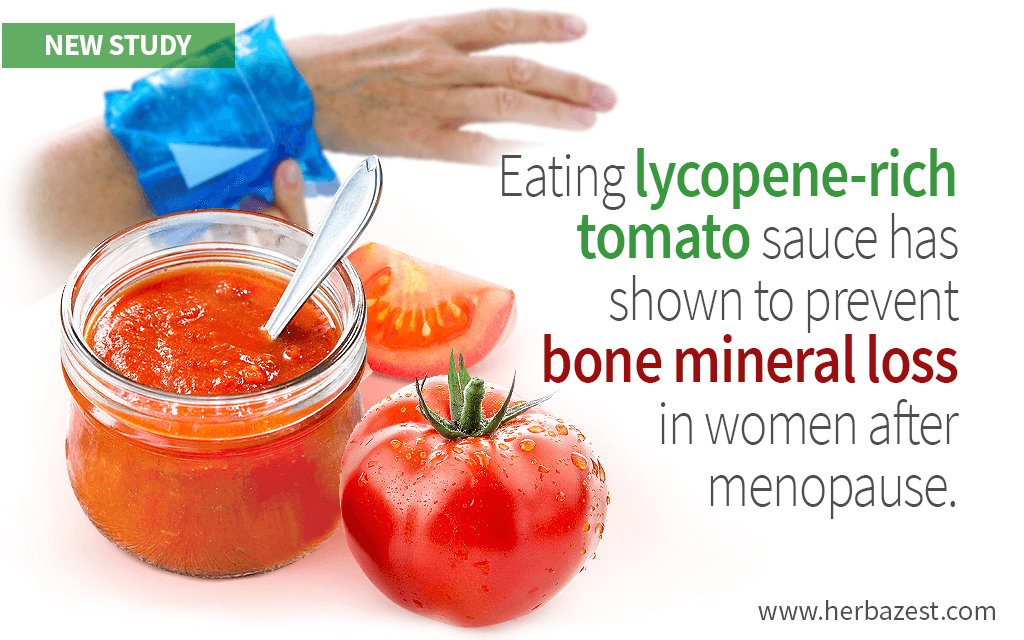Osteoporosis, characterized by a low bone mineral density (BMD), is a serious risk among postmenopausal women.1 Many, however, do not receive the treatment they need, mainly due to potential side effects.
Carotenoids, like lycopene, are known to regulate bone metabolism and can improve BMD and reduce fracture risk.2 Tomatoes' lycopene has been subject of many scientific studies aimed at determining its benefits for human health. Its effects on bone health, however, have scarcely been studied.
The aim of this two-legged study was to investigate the effects of lycopene on osteoblast function and determine whether lycopene-rich tomato sauce can prevent bone loss in postmenopausal women.
The Study
This 2020 research project consisted of an in vitro trial as well as a pilot human clinical trial, both conducted by researchers from the University Magna Graecia in Catanzaro, Italy.
For the in vitro investigation, researchers obtained human osteoblast-like cells that were incubated with lycopene from tomatoes or the placebo for 24 hours.
For the clinical trial component, researchers recruited 78 postmenopausal women, at the average age of 63. Half of them were assigned to the intervention group and received 150 mL of tomato sauce per day for three months. The other half were assigned to the control group and were not given tomato sauce.
Numerous markers were recorded before and after the study, such as body mass index, blood pressure, cholesterol levels, and various bone health-related markers, such as BMD and bone alkaline phosphatase (BAP).
The Results
The in vitro study showed that tomato's lycopene does not affect osteoblast proliferation. It does, however, positively influence osteoblast differentiation. For reference, bone formation can be enhanced by either increasing osteoblast proliferation or inhibiting its differentiation.
The human trial showed that there was no loss of BMD in the tomato group (0.08% BMD change), with a 5.3% reduction of BMD observed in the control group.
Additionally, women in the tomato group showed a greater reduction of BAP (18%) than those in the control group (8.5%). BAP is an indicator of bone metabolism, and its high levels are common in osteoporosis.
What Does this Mean?
This two-legged study provides new insights into the effects of tomatoes' lycopene on bone health and osteoporosis prevention. They encourage larger studies to explore new therapeutic applications of lycopene.
While the results of the in vitro study have important therapeutic implications, some still need further clarification.
The discoveries of the human component, on the other hand, clearly demonstrate that the consumption of lycopene-rich tomatoes can prevent bone loss in postmenopausal women. Researchers suggest that the changes they observed in BAP levels are comparable to those seen with pharmaceutical drugs, like raloxifene.
Other herbs with bone-protecting abilities are collard greens, spinach, sweet potatoes, and papaya.
Sources
- Journal of Translational Medicine, Lycopene and bone: an in vitro investigation and a pilot prospective clinical study, 2020
Footnotes:
- Chronic Diseases and Translational Medicine. (2015). Primary osteoporosis in postmenopausal women. Retrieved October 16, 2020 from https://www.ncbi.nlm.nih.gov/pmc/articles/PMC5643776/
- British Journal of Nutrition. (2017). Carotenoiddietary intakes and plasma concentrations are associated with heel boneultrasound attenuation and osteoporotic fracture risk in the European Prospective Investigation into Cancer and Nutrition (EPIC)-Norfolk cohort. Retrieved October 16, 2020 from https://www.cambridge.org/core/journals/british-journal-of-nutrition/article/carotenoid-dietary-intakes-and-plasma-concentrations-are-associated-with-heel-bone-ultrasound-attenuation-and-osteoporotic-fracture-risk-in-the-european-prospective-investigation-into-cancer-and-nutrition-epicnorfolk-cohort/00A438667470EF45BD68B3BCCA02453D





